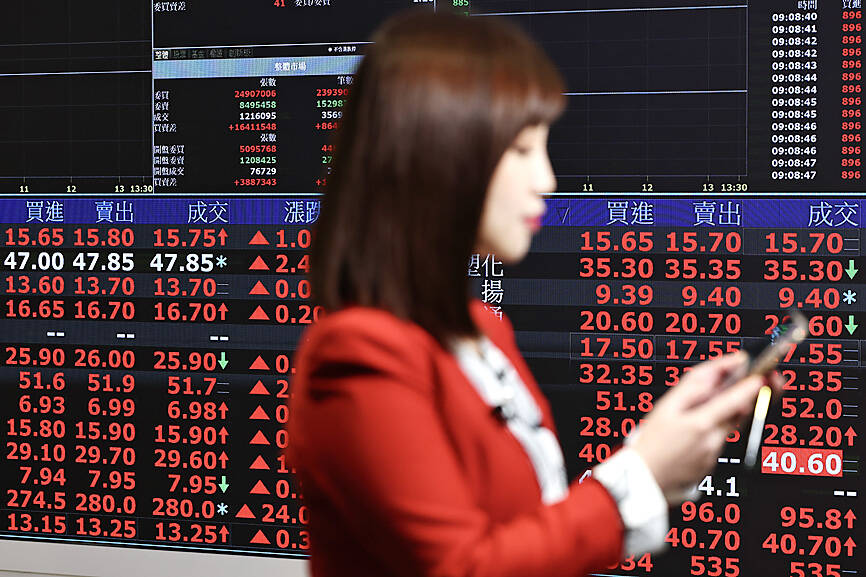Tax revenue last month fell 2.8 percent year-on-year to NT$232.4 billion (US$7.15 billion), as fears of potential US tariffs on all imports spooked investors around the world and dampened securities trading in Taiwan, the Ministry of Finance said yesterday.
Tax revenue from securities transactions posted the steepest decline among all major categories, plunging 24.6 percent — or NT$7.2 billion — to NT$21.9 billion, the lowest in 26 months, the ministry’s monthly report showed.
Average daily turnover of the local stock market fell to NT$400.4 billion, down 27.4 percent from a year earlier and hitting the lowest in 14 months, it added.

Photo: CNA
The drop followed US President Donald Trump’s hawkish and unpredictable tariff talks, which unsettled global financial markets and drove investors to the sidelines, the ministry said.
Meanwhile, personal income tax revenue declined 14.1 percent year-on-year to NT$34.9 billion, which the ministry attributed to an unfavorable comparison base due to the timing of the Lunar New Year holiday.
This year, the holiday fell mainly in January, while last year it occurred entirely in February — delaying some year-end bonuses and associated tax withholdings to March, the ministry said.
However, not all tax categories recorded declines.
Business tax revenue rose 5.7 percent to NT$110.9 billion, buoyed by steady domestic demand and robust exports, as companies front-loaded shipments amid Trump’s tariff threat, it added.
In the first quarter of this year, total tax revenue amounted to NT$554 billion, down 0.6 percent from the same period last year and slightly below the ministry’s budget target, the report said.
The most significant declines were in securities transaction tax, business tax and commodity tax revenues, which fell NT$5.2 billion, NT$4.3 billion and NT$3.3 billion respectively, compared with the January-to-March period last year, the ministry said
The declines were partially offset by a NT$12.8 billion increase in personal income tax revenue, driven by wage growth and higher cash dividends distributed by listed firms, it said.

NEW IDENTITY: Known for its software, India has expanded into hardware, with its semiconductor industry growing from US$38bn in 2023 to US$45bn to US$50bn India on Saturday inaugurated its first semiconductor assembly and test facility, a milestone in the government’s push to reduce dependence on foreign chipmakers and stake a claim in a sector dominated by China. Indian Prime Minister Narendra Modi opened US firm Micron Technology Inc’s semiconductor assembly, test and packaging unit in his home state of Gujarat, hailing the “dawn of a new era” for India’s technology ambitions. “When young Indians look back in the future, they will see this decade as the turning point in our tech future,” Modi told the event, which was broadcast on his YouTube channel. The plant would convert

‘SEISMIC SHIFT’: The researcher forecast there would be about 1.1 billion mobile shipments this year, down from 1.26 billion the prior year and erasing years of gains The global smartphone market is expected to contract 12.9 percent this year due to the unprecedented memorychip shortage, marking “a crisis like no other,” researcher International Data Corp (IDC) said. The new forecast, a dramatic revision down from earlier estimates, gives the latest accounting of the ongoing memory crunch that is affecting every corner of the electronics industry. The demand for advanced memory to power artificial intelligence (AI) tasks has drained global supply until well into next year and jeopardizes the business model of many smartphone makers. IDC forecast about 1.1 billion mobile shipments this year, down from 1.26 billion the prior

People stand in a Pokemon store in Tokyo on Thursday. One of the world highest-grossing franchises is celebrated its 30th anniversary yesterday.

Zimbabwe’s ban on raw lithium exports is forcing Chinese miners to rethink their strategy, speeding up plans to process the metal locally instead of shipping it to China’s vast rechargeable battery industry. The country is Africa’s largest lithium producer and has one of the world’s largest reserves, according to the US Geological Survey (USGS). Zimbabwe already banned the export of lithium ore in 2022 and last year announced it would halt exports of lithium concentrates from January next year. However, on Wednesday it imposed the ban with immediate effect, leaving unclear what the lithium mining sector would do in the